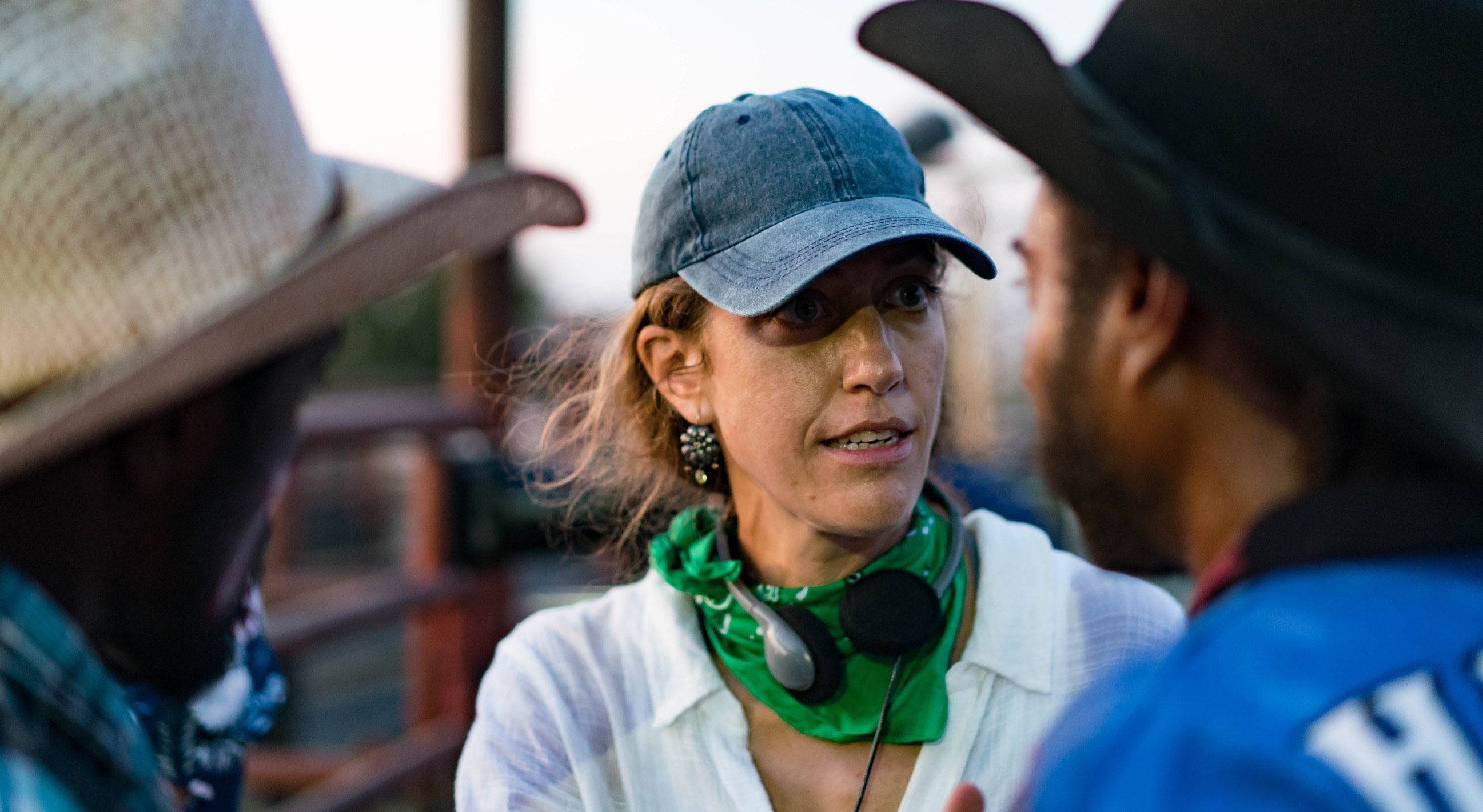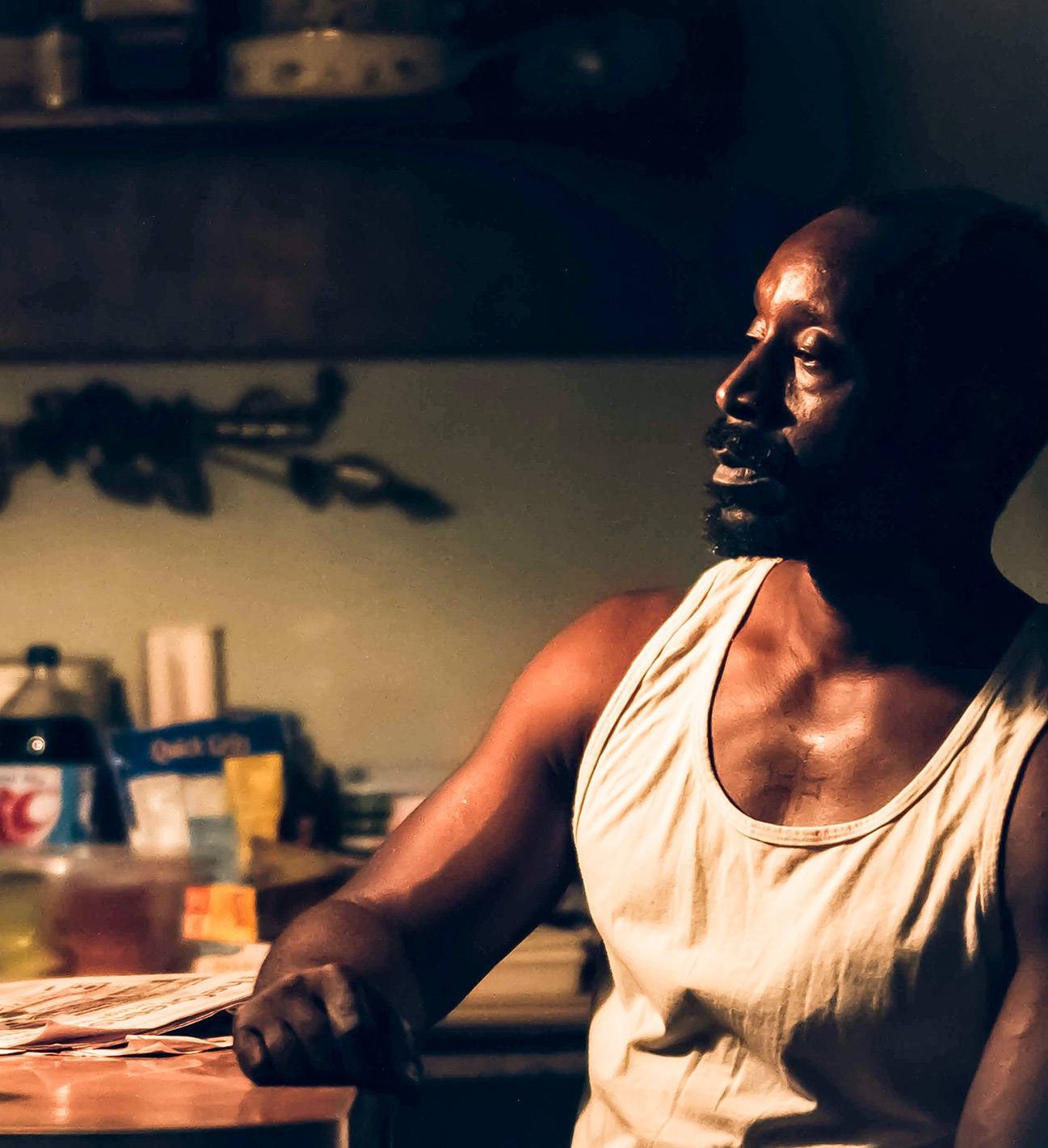
Ready for the reel world
by Robyn Ross
Texas State’s B.F.A. in performance and production teaches students to view the industry through a practical lens
Bravo Michael Nwosu (B.F.A. ’18) trudged across the Wharton County ranchland, squinting into the midday sun as he dodged piles of cow manure. The camera equipment he was carrying felt even heavier in the muggy 100-degree heat. Rivulets of sweat trickled through the layer of dust that had settled onto his skin.
Two months after graduating from Texas State with a degree in performance and production, he was working in the film industry. The conditions on location for “Bull,” cowritten and produced by Texas State assistant professor Johnny McAllister and directed by Austin filmmaker Annie Silverstein, were tough. The film, set in the rodeo world of African-American bull riders, was shot last summer in hot, dusty arenas near Houston.
Nwosu wasn’t complaining. He was learning, and he was expanding his network. When filming wrapped in August, his New York-based contacts encouraged him to move to the city. He packed a suitcase and bought a one-way ticket. He got jobs almost immediately as an assistant on a Fashion Week shoot, as a production assistant on a film, and as director of photography for some shows at the comedy club Upright Citizens Brigade Theatre. All the gigs came through connections he’d made during “Bull.” His housing was also a benefit of networking; Nwosu crashed on the couch of the gaffer, or head electrician, his first three weeks in the city.
Students such as Nwosu are launching careers with the help of Texas State’s practical, industry-focused film program, a sequence of courses within the B.F.A. in theatre. The classes are taught by experienced professionals who help students tap into their network in the growing industry.
“This is a golden age for film and television, and I think Texas State has an important part to play,” says Deb Alley, chair of the Department of Theatre and Dance.
"It’s difficult to get a job in the arts, no matter what you’re doing. But film pays a lot better, and there are a lot more jobs in film than in theatre. If one doesn’t work out, maybe the other will.” — Tom Copeland
While the university doesn’t offer a degree in film, students in Theatre, Performance and Production can customize their studies by taking a growing number of film classes. It’s unusual for a university to house film courses in a theatre department — but that strategy has two advantages, says Tom Copeland. A former Bobcat (1968 to 1972), Copeland retired from the faculty of the College of Fine Arts and Communication in 2018. He was also the director of the Texas Film Commission before joining the university and establishing the program’s courses.
“It’s difficult to get a job in the arts, no matter what you’re doing,” Copeland says. “Film pays a lot better, and there are a lot more jobs in film than in theatre. If one doesn’t work out, maybe the other will.” In addition to helping theatre majors discover more career options, locating film courses in the theatre department assists budding filmmakers. When they need actors, set designers, and makeup artists for their projects, student talent is available.

When Copeland began teaching at Texas State in 2005, his objective was clear: to show college students how the film industry really works. He’d met too many young people who expected their film degree to launch them straight into writing and directing. “It just does not work that way at all,” he says. “The only way in is the entry-level position: production assistant.”
At Texas State, Copeland created a course called the Business of Film, “a reality-based class that tells you how to get your foot in the door.” He brought in guest speakers — producers, production managers, location managers, production designers — who often gave students their email address.
McAllister, who joined Texas State in 2017, joins other part-time faculty with experience in the industry: Betty Buckley, Susan Busa, Shelby Hadden, Randy Huke, Clay Liford, Bryan Poyser, and Richard Sodders. “We are sitting on a gold mine of talent,” Alley says.
McAllister has filmmaking experience in crewing, lighting, editing, and production management. He teaches the hands-on film practices; directing for film; and advanced directing, in which students endeavor to make a festival-worthy film. These courses complement the department’s existing classes in editing, cinematography, production design, and film producing. The goal is for each graduate to be what McAllister calls “a complete filmmaker: someone who has a lot of different skills, understands all aspects of the filmmaking craft, and feels comfortable in different settings.”
What makes a person successful in film, Copeland and McAllister agree, is versatility, a good network, and a willingness to work hard. Texas State theatre students have that practical mindset.
They understand the value of hard work, of discipline, of going out and working your way up, and paying your dues. They’re not afraid of getting their hands a little dirty.” — Deb Alley, chair, Department of Theatre and Dance
“It’s not that they’re not artistic, because they are,” Alley explains. “They understand the value of hard work, of discipline, of going out and working your way up, and paying your dues. They’re not afraid of getting their hands a little dirty.”
Students pursuing the film focus have interned on films made by Austin directors Robert Rodriguez and Richard Linklater, on the television series “Friday Night Lights,” and at the Texas Film Commission.
Stacey Rice (B.A. ’11) launched her career with the help of an internship at the Texas Film Commission. She landed that job through a colleague of Copeland’s who’d spoken to her class, and her work at the commission led to an internship with director Terrence Malick (“The Tree of Life” and “Thin Red Line”). When Rice realized she wanted to pursue casting, Malick recommended her to Beth Sepko, an Emmy-winning Austin casting director. Sepko hired Rice first as an intern and then as a casting assistant for television shows “The Son” and “The Leftovers” and the big-budget Robert Rodriguez-James Cameron film “Alita: Battle Angel.” Last year Rice moved to Los Angeles, where she works for one of the country’s top casting directors on shows including HBO’s dark teen drama “Euphoria.”
“Having been in Tom’s class and making these contacts, one thing kind of led to another, which is truly how the film industry works,” Rice says. “It’s networking and making the contacts and putting in the hard work — and I really learned that at Texas State.” ✪